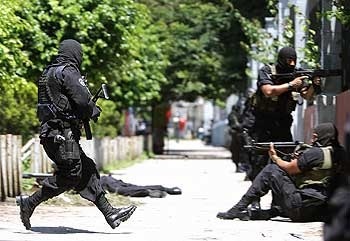El Salvador’s Inspector General for Human Rights has accused police and soldiers of committing extrajudicial executions in two massacres last year, a blow to law enforcement’s credibility as the country ramps up its latest offensive against gang violence.
At an April 25 press conference, David Morales (Procurador para la Defensa de los Derechos Humanos) said that investigations “showed serious indications that government agents acted outside the law,” in two supposed shootouts, La Prensa reported. The confrontations in question occurred at the San Blas estate on March 26, 2015, and Los Pajales in the municipality of Panchimalco on August 16, 2015.
Police reported that eight criminals were killed in a shootout with officers and soldiers at San Blas, and one police officer was slightly injured. In Los Pajales, five suspected gang members were reported killed in a shootout, with no injuries to security agents.
Morales said evidence collected from the scenes in both cases conflict with the official reports.
“In both cases we … have come to the conclusion that there have been extrajudicial executions,” La Prensa quoted Morales as saying. He said three of the bodies at Los Pajales showed signs of having been reinjured after being motally wounded. At San Blas, Morales said, four bodies had been moved “to alter the scene” and one body showed signs of brain trauma. The inspector general’s office tweeted: “The State can not be the same as or worse than the criminal. It is worrying to get cases of confrontations where extralegal killings are reported.”
El Estado no puede ser peor o igual que el criminal, es preocupante casos de enfrentamientos donde se informa de ejecuciones extralegales.
— PDDH El Salvador (@PDDHElSalvador) April 25, 2016
InSight Crime Analysis
Extrajudicial killings committed by death squads composed of police and soldiers are not a new phenomena in El Salvador. Last year, investigations by Salvadoran media outlets suggested that death squads in police-like uniforms were responsible for the deaths of more than a dozen people, some of whom had no gang affiliation, and that the killings were not investigated by authorities. And death squads and extrajudicial killings were common during the country’s 12-year civil war, which ended in 1992.
Morales’ office revealed during the press conference that they are currently reviewing 30 suspected cases of extrajudicial killings that involve a total of 100 deaths, reported El Diario de Hoy.
Gangs have a presence into various areas of the country, including the educational system, where they have killed 29 teachers and 130 students, according to a recent report picked up by Notiaméricaérica. In response to elevated gang activity and violence, the Salvadoran government is increasingly relying on its anti-gang forces as the country faces a security crisis. On April 20, the country deployed its new Special Reaction Force (Fuerza Especial de Reacción El Salvador – FERES), which was initially tasked with capturing gang members who have fled to rural areas to avoid increased enforcement in cities and towns.
As the country steps up the pressure against street gangs, Salvadoran security officials would do well to heed a lesson they should have learned from the civil war: official abuses and impunity are no way to establish law and order or reduce levels of violence in a sustainable way.

